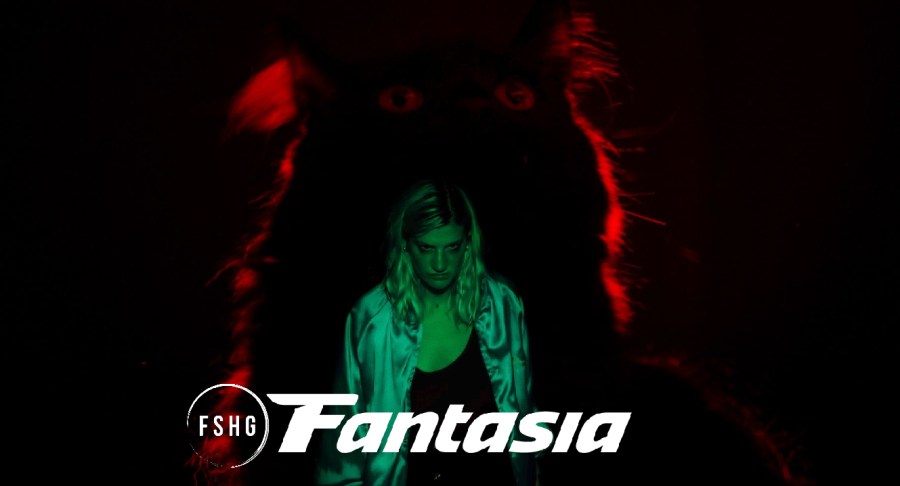Booger (2023)
Directed & Written by Mary Dauterman
Starring Grace Glowicki, Garrick Bernard, Marcia DeBonis, & Sofia Dobrushin.
Comedy / Fantasy / Horror
★★★★ (out of ★★★★★)
DISCLAIMER:
The following essay
contains SPOILERS!
You’ve been warned.
Repressing pain is a part of our lives because, no matter how much we try to pay attention to our mental health, it’s always easier to defer pain instead of sitting in it, living with it, soaking it up deep into our psyche. After Anna (Grace Glowicki) loses her close friend and roommate Izzy (Sofia Dobrushin), she also loses their cat, Booger, and it seems like nothing at all is going right in her life. The pain seems to compound, as Anna’s also in debt and behind on rent. On top of that, before Booger left he bit Anna, and the wound refuses to heal. Worse than that, the wound almost seems to be altering Anna… like she’s becoming a cat. That couldn’t happen, could it? All Anna knows is that she’s changing and it’s not in a good way.
The horror genre is no stranger to allegorical stories about psychological trauma embodied in the physical lives of characters. In Mary Dauterman’s Booger, Anna’s physical state becomes a grotesque mirror of the pain inside that she refuses to deal with, and the more she represses the deeper wound within, the more her outside wound turns her into somebody, or some thing, she doesn’t recognise. Humans often marvel at how cats are notorious for masking and outright hiding their pain, an old instinct from their wild days. But are humans any different? We run from pain rather than face it. That’s how Anna nearly loses herself.
 Dauterman’s use of the physical-emotional binary for psychological horror isn’t new, it’s just so interesting and fun because of the cat behaviour, which makes for a darkly comic and at times truly grotesque story. Anna starts out with little noticeable increases in hearing and a sense of touch, as all sorts of sounds become near deafening to her. Her pupils dilate while the hair on her arms stands up when she hears something that catches her attention. She unconsciously chews and sucks on her hair, as if she were a cat cleaning herself. She’s distracted by birds in the pet store. She crushes a butterfly in her hand like a cat with a clumsy paw. She begins to cough up hairballs. And the wound she received from Booger’s bite isn’t healing. It actually gets worse and grows a hair. At one point Anna’s starving, she’s in debt, her power gets shut off, so she chows down like a hungry feline and devours a tin of cat food. She’s become so unlike herself due to grief that she believes she’s becoming a cat.
Dauterman’s use of the physical-emotional binary for psychological horror isn’t new, it’s just so interesting and fun because of the cat behaviour, which makes for a darkly comic and at times truly grotesque story. Anna starts out with little noticeable increases in hearing and a sense of touch, as all sorts of sounds become near deafening to her. Her pupils dilate while the hair on her arms stands up when she hears something that catches her attention. She unconsciously chews and sucks on her hair, as if she were a cat cleaning herself. She’s distracted by birds in the pet store. She crushes a butterfly in her hand like a cat with a clumsy paw. She begins to cough up hairballs. And the wound she received from Booger’s bite isn’t healing. It actually gets worse and grows a hair. At one point Anna’s starving, she’s in debt, her power gets shut off, so she chows down like a hungry feline and devours a tin of cat food. She’s become so unlike herself due to grief that she believes she’s becoming a cat.
Because ultimately this is a story of repression and what it does to the psychological state, particularly in the wake of all-encompassing grief, which is where Anna finds herself after Izzy’s death. Anna can’t accept that Izzy is gone, though she knows it’s the truth. This is also reflected in the fact she doesn’t consciously remember that Booger went missing long ago; she’s so wrapped up grief that the whole of her memory is warped. Booger was adopted after randomly climbing the fire escape and walking into Izzy and Anna’s lives, so he became like a piece of them, a part of the tapestry of their friendship. When Anna’s mind was trying to avoid Izzy’s death and all the pain it entailed, she couldn’t accept that the part of her and Izzy that still existed, Booger, had already gone missing.
“You can’t keep it all inside, okay?
You’ll just rot.”
Gothic horror is all about a return of the repressed, and Booger fits the bill because Anna has to face all that she’s repressed coming crashing down on her in a horrific, albeit sometimes darkly funny way. While a lot of gothic horror involves a return of the repressed that’s threatening, Anna’s encounter with repression is, in the end, a liberating one that allows her to move on, and culminates with a welcomed return of a special friend, too.
Booger is a powerful little gothic tale about mental health because in Dauterman’s film the focus is not on those around us not caring—Anna’s surrounded by people, other than her shitty landlord, who try to help her—it’s about the ways in which we as individuals repress our pain and trauma, how we lie to ourselves about what we need most, and its greatest power is in the hope that remains for us amongst, and in spite of, the mind’s own gothic horror.

